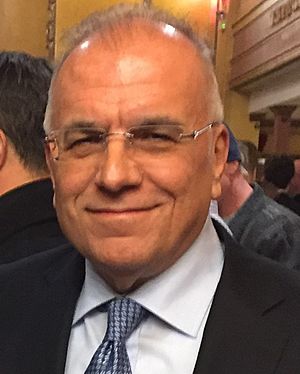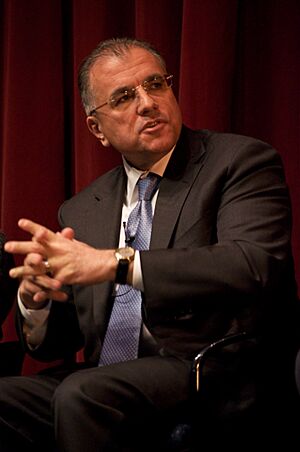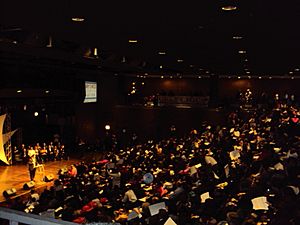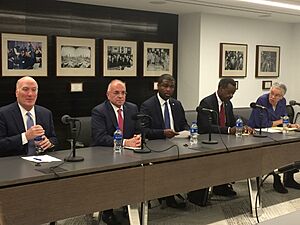Gery Chico facts for kids
Quick facts for kids
Gery Chico
|
|
|---|---|

Chico in 2018
|
|
| Chair of the Illinois State Board of Education | |
| In office June 7, 2011 – January 12, 2015 |
|
| Governor | Pat Quinn |
| Preceded by | Jesse Ruiz |
| Succeeded by | James Meeks |
| President of the Chicago Park District Board of Commissioners | |
| In office October 2007 – March 2010 |
|
| Appointed by | Richard Daley |
| Succeeded by | Bryan Traubert |
| President of the Chicago Board of Education | |
| In office 1995–2001 |
|
| Preceded by | D. Sharon Grant |
| Succeeded by | Michael Scott Sr. |
| Personal details | |
| Born | August 24, 1956 Chicago, Illinois, U.S. |
| Political party | Democratic |
| Education | University of Illinois, Urbana-Champaign University of Illinois, Chicago (BA) Loyola University Chicago (JD) |
Gery J. Chico (born August 24, 1956) is an American politician and lawyer from Illinois. He has held many important jobs in Chicago and for the state of Illinois. He also ran for U.S. Senator and for Mayor of Chicago.
Chico worked closely with Chicago Mayor Richard M. Daley, serving as his Chief of Staff from 1992 to 1995. A Chief of Staff is a top advisor who helps a leader manage their team and projects. After that, he became the president of the Chicago Public Schools board, where he served until 2001. For his work, the Illinois State Board of Education named him Outstanding School Board President in 1997.
Over the years, Chico has led other important groups, including the Chicago Park District and the City Colleges of Chicago. In 2011, he was chosen to be the Chairman of the Illinois State Board of Education, which oversees all public schools in the state.
Chico has run for Mayor of Chicago twice. In the 2011 election, he lost to Rahm Emanuel. He ran again in the 2019 election and later supported Lori Lightfoot, who won.
Contents
Early Life and School
Gery Chico was born in Chicago on August 24, 1956. His father was Mexican-American and his mother was of Greek and Lithuanian heritage. He grew up in the McKinley Park neighborhood with his two younger brothers.
Chico went to a local Catholic elementary school and later attended Thomas Kelly High School. A hip injury during his first year of high school meant he had to use a wheelchair for a while.
For college, he first studied to be a doctor at the University of Illinois at Urbana–Champaign. He then transferred to the University of Illinois at Chicago to study political science. During his senior year, he started working for the city's Department of Planning. He earned his bachelor's degree in 1978. While working for the city, he attended law school at night and earned his law degree from Loyola University Chicago School of Law in 1985.
Career in Law and Government
Working for the City
In 1991, Chico became a Deputy Chief of Staff for Mayor Richard M. Daley. One of his first big challenges was helping to manage the cleanup of a major flood in Chicago's downtown freight tunnels.
Mayor Daley later promoted him to Chief of Staff, a job he held from 1992 to 1995. In this role, he helped manage big projects like the new International Terminal at O'Hare International Airport and the city's preparations for the 1994 FIFA World Cup. He also worked with Budget Director Paul Vallas to add 1,000 more police officers to the city's force.
Leading Chicago's Schools
In 1995, Mayor Daley asked Chico to lead the Chicago Public Schools (CPS). Chico became the president of the school board. He and CPS CEO Paul Vallas worked to improve the school system.
During his time as board president, Chico also led an effort to save and restore hundreds of murals in public schools. These artworks were created during the New Deal era but had been covered up over time.
Chico left his position at the school board in 2001. He was followed by Michael W. Scott.
Running for Office
2004 U.S. Senate Campaign
In 2004, Chico ran for a seat in the U.S. Senate. He was one of several Democrats who wanted the job. He supported ideas like universal healthcare and stem cell research. He was the only candidate in the race, from either party, who supported gay marriage at the time. Barack Obama, who was a state senator then, won the Democratic nomination and later the election.
2011 Campaign for Mayor of Chicago
When Mayor Daley announced he would not run for reelection in 2011, Chico decided to run for mayor. He was seen as a strong candidate who could challenge the frontrunner, Rahm Emanuel.
Chico talked about his experience working for the city and leading the school board. He also highlighted his background as the son of an immigrant father who grew up on Chicago's South Side. He received a lot of support from Chicago's Hispanic community.
In the end, Rahm Emanuel won the election with over 55% of the vote. Chico came in second place with about 24% of the vote.
2019 Campaign for Mayor of Chicago
Chico ran for mayor again in the 2019 Chicago mayoral election. He once again focused on his experience in city government and education.
The election had many candidates, and no one won a majority in the first round of voting. Chico finished in eighth place. After he was out of the race, he endorsed Lori Lightfoot, who went on to win the final runoff election.
More Public Service
Chicago Park District and City Colleges
In 2007, Mayor Daley appointed Chico as president of the Chicago Park District board. He held this position until 2010.
In 2010, Daley also named him chairman of the board for the City Colleges of Chicago. Chico and Chancellor Cheryl Hyman worked to reform the college system's budget and focus more money on technology and student training. He left this role after eight months to run for mayor.
Illinois State Board of Education
From 2011 to 2015, Chico served as the chairman of the Illinois State Board of Education. He was appointed by Governor Pat Quinn. This board is in charge of setting policies for public schools across the entire state of Illinois.
Recent Work
In 2019, Chico became the board chairman of a nonprofit group called Local Initiatives Support Corporation Chicago. The organization helps support neighborhoods in need by providing money and assistance to community groups.
Electoral history
| Party | Candidate | Votes | % | |
|---|---|---|---|---|
| Democratic | Barack Obama | 655,923 | 52.8% | |
| Democratic | Daniel W. Hynes | 294,717 | 23.7% | |
| Democratic | M. Blair Hull | 134,453 | 10.8% | |
| Democratic | Maria Pappas | 74,987 | 6.0% | |
| Democratic | Gery Chico | 53,433 | 4.3% | |
| Democratic | Nancy Skinner | 16,098 | 1.3% | |
| Democratic | Joyce Washington | 13,375 | 1.1% | |
| Democratic | Estella Johnson-Hunt (write-in) | 10 | 0.0% | |
| Total votes | 1,242,996 | 100.0% | ||
| Party | Candidate | Votes | % | |
|---|---|---|---|---|
| Nonpartisan politician | Rahm Emanuel | 326,331 | 55.27 | |
| Nonpartisan politician | Gery J. Chico | 141,228 | 23.92 | |
| Nonpartisan politician | Miguel del Valle | 54,689 | 9.26 | |
| Nonpartisan politician | Carol Moseley Braun | 53,062 | 8.99 | |
| Nonpartisan politician | Patricia Van Pelt Watkins | 9,704 | 1.64 | |
| Nonpartisan politician | William Walls, III | 5,343 | 0.90 | |
| Write-in | Tommy Hanson | 9 | 0.00 | |
| Write-in | John C. Hawkins | 8 | 0.00 | |
| Write-in | “Fredrick” “Frederick” “Fred” “F.” K. White | 6 | 0.00 | |
| Write-in | Alfredo Castillo | 4 | 0.00 | |
| Write-in | John Hu | 4 | 0.00 | |
| Write-in | Alex George (AG) | 3 | 0.00 | |
| Turnout | 590,391 | 41.99 | ||
| 2019 Chicago mayoral election | ||||
|---|---|---|---|---|
| Candidate | General Election | Runoff Election | ||
| Votes | % | Votes | % | |
| Lori Lightfoot | 97,667 | 17.54 | 386,039 | 73.70 |
| Toni Preckwinkle | 89,343 | 16.04 | 137,765 | 26.30 |
| William Daley | 82,294 | 14.78 | ||
| Willie Wilson | 59,072 | 10.61 | ||
| Susana Mendoza | 50,373 | 9.05 | ||
| Amara Enyia | 44,589 | 8.00 | ||
| Jerry Joyce | 40,099 | 7.20 | ||
| Gery Chico | 34,521 | 6.20 | ||
| Paul Vallas | 30,236 | 5.43 | ||
| Garry McCarthy | 14,784 | 2.66 | ||
| La Shawn K. Ford | 5,606 | 1.01 | ||
| Robert "Bob" Fioretti | 4,302 | 0.77 | ||
| John Kolzar | 2,349 | 0.42 | ||
| Neal Sales-Griffin | 1,523 | 0.27 | ||
| Write-ins | 86 | 0.02 | ||
| Total | 556,844 | 100 | 523,804 | 100 |
External links
- Chico & Nunes, P.C.
- Gery Chico for Mayor




